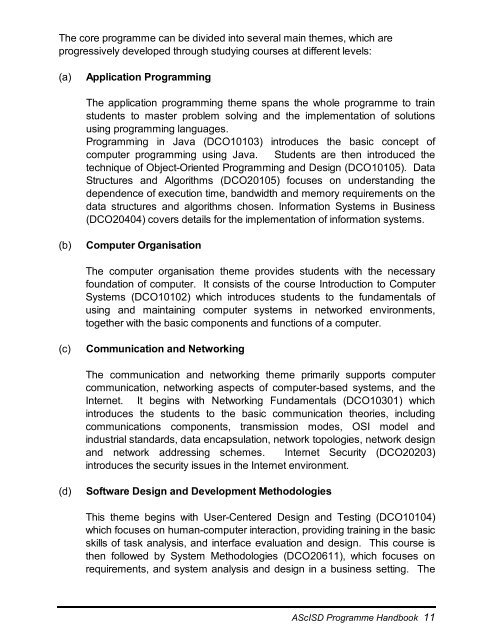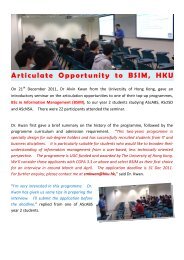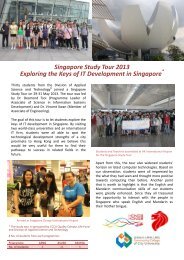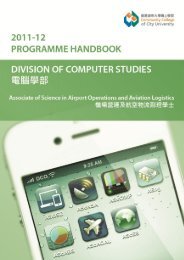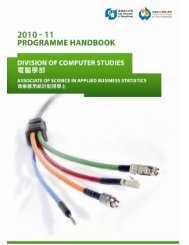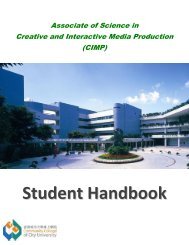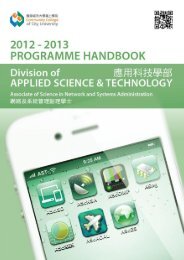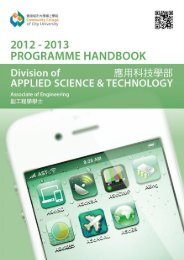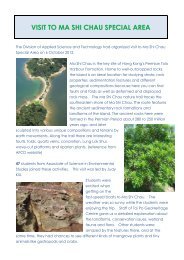S tudent H andbookk - Division of Applied Science and Technology
S tudent H andbookk - Division of Applied Science and Technology
S tudent H andbookk - Division of Applied Science and Technology
Create successful ePaper yourself
Turn your PDF publications into a flip-book with our unique Google optimized e-Paper software.
The core programme can be divided into several main themes, which are<br />
progressively developed through studying courses at different levels:<br />
(a)<br />
Application Programming<br />
The application programming theme spans the whole programme to train<br />
s<strong>tudent</strong>s to master problem solving <strong>and</strong> the implementation <strong>of</strong> solutions<br />
using programming languages.<br />
Programming in Java (DCO10103) introduces the basic concept <strong>of</strong><br />
computer programming using Java. S<strong>tudent</strong>s are then introduced the<br />
technique <strong>of</strong> ObjectOriented Programming <strong>and</strong> Design (DCO10105). Data<br />
Structures <strong>and</strong> Algorithms (DCO20105) focuses on underst<strong>and</strong>ing the<br />
dependence <strong>of</strong> execution time, b<strong>and</strong>width <strong>and</strong> memory requirements on the<br />
data structures <strong>and</strong> algorithms chosen. Information Systems in Business<br />
(DCO20404) covers details for the implementation <strong>of</strong> information systems.<br />
(b)<br />
Computer Organisation<br />
The computer organisation theme provides s<strong>tudent</strong>s with the necessary<br />
foundation <strong>of</strong> computer. It consists <strong>of</strong> the course Introduction to Computer<br />
Systems (DCO10102) which introduces s<strong>tudent</strong>s to the fundamentals <strong>of</strong><br />
using <strong>and</strong> maintaining computer systems in networked environments,<br />
together with the basic components <strong>and</strong> functions <strong>of</strong> a computer.<br />
(c)<br />
Communication <strong>and</strong> Networking<br />
The communication <strong>and</strong> networking theme primarily supports computer<br />
communication, networking aspects <strong>of</strong> computerbased systems, <strong>and</strong> the<br />
Internet. It begins with Networking Fundamentals (DCO10301) which<br />
introduces the s<strong>tudent</strong>s to the basic communication theories, including<br />
communications components, transmission modes, OSI model <strong>and</strong><br />
industrial st<strong>and</strong>ards, data encapsulation, network topologies, network design<br />
<strong>and</strong> network addressing schemes. Internet Security (DCO20203)<br />
introduces the security issues in the Internet environment.<br />
(d)<br />
S<strong>of</strong>tware Design <strong>and</strong> Development Methodologies<br />
This theme begins with UserCentered Design <strong>and</strong> Testing (DCO10104)<br />
which focuses on humancomputer interaction, providing training in the basic<br />
skills <strong>of</strong> task analysis, <strong>and</strong> interface evaluation <strong>and</strong> design. This course is<br />
then followed by System Methodologies (DCO20611), which focuses on<br />
requirements, <strong>and</strong> system analysis <strong>and</strong> design in a business setting. The<br />
AScISD Programme H<strong>and</strong>book 11


